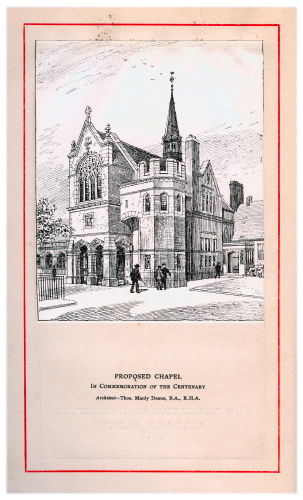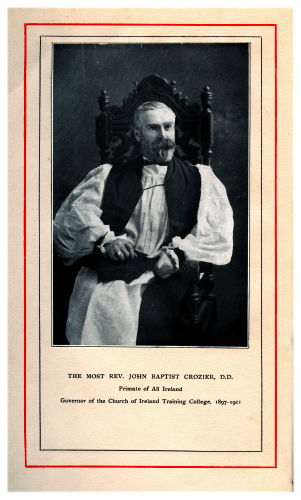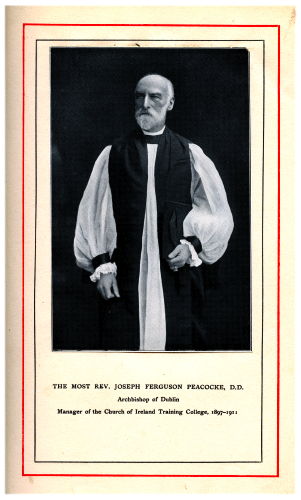INTRODUCTION
 THIS Book is intended to serve as a memorial of the Training College in Kildare Place, Dublin; and of the work in the promotion of Primary Education in Ireland which it has accomplished during the last hundred years.
THIS Book is intended to serve as a memorial of the Training College in Kildare Place, Dublin; and of the work in the promotion of Primary Education in Ireland which it has accomplished during the last hundred years.
In the pages that follow, the Principal, Dr. Kingsmill Moore, has traced the history of the College throughout its eventful career. Primary Education as a system can hardly be said to have existed in Ireland when the Kildare Place Society began its work in the year 1811. Progress has been slow, but steady; and during the last few years its pace has been decidedly quickened.
Formerly it was not at all so dearly understood as it is now that teaching is an art which has to be acquired. It is now recognised that those who hold the responsible office of teaching children should not only be themselves well instructed in the subjects they have to teach, but also be carefully trained in the art of teaching, and in the best methods of managing a school. This College, from its foundation, has kept this fact steadily in view, and has been fulfilling its office with zeal and efficiency. But it is since its reconstruction as a Department of State Education twenty-six years ago that it has reached the high position which it now holds, as the Church of Ireland Training College, under the able administration of the Principal, and the Staff associated with him.
In the Department of Secular Education the students are trained for their future work according to the most approved methods, under the control of the Board of National Education. The children of our Church, when they come under the charge of teachers thus prepared, have, therefore, the advantage of receiving an education in our Primary Schools which enables them to compete successfully with their fellows in the race of life.
But, further, it is a distinguishing feature of our College that the most careful attention is paid to the religious and moral training of the students. They are not only fully instructed in the principles of religion, as held by our Church, and trained in the best methods of giving religious instruction to their future pupils, but also every effort is made to render the whole tone of the College of such a character that the students may carry away with them the impression that all true education rests upon a religious and moral basis, and that they may go forth to their work as teachers resolved, in God's strength, to devote themselves to it on these lines.
The importance of the training given in the College, in both these departments -- secular and religious -- cannot well be exaggerated; and the fact that the teachers it trains are in request for Church Schools all over Ireland, is in itself a proof of its marked success and of the confidence reposed in it by the Managers of our Schools.
It may safely be said that the College is well equipped for its responsible work in all respects, except one. A College for the training of teachers ought to be provided with a Chapel, it is incomplete without it -- a building separated from secular uses, in which the students can meet for daily prayer and worship, and for hearing addresses upon missionary and other subjects bearing upon the Church's work.
It is proposed to commemorate the occasion of the Centenary by the erection of such a building. Plans have been prepared by an architect to enlarge and adapt one of our present buildings so as to make it suitable for the purpose. A sum of £464 has been already provided, mainly by the gifts of past students, who have always shown, in a tangible form, their deep interest in the College, and is available as the nucleus of a fund for this object. It is believed that the whole project could be satisfactorily accomplished for about £2,500. This unique occasion could hardly be commemorated by a more fitting memorial; and the Governors hope that the proposal will meet with the generous support of the friends of the College who understand and value the good work it has done and is doing for the Church.
J. F. DUBLIN.



